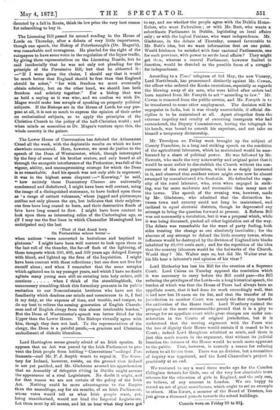Lord Hartington seems greatly afraid of an Irish spectre. It
appears that an Act was passed by the Irish Parliament to pre- vent the Irish people from holding " Conventions "—illegal Par- liaments—and Mr. P. J. Smyth wants to repeal it. The Secre- tary for Ireland, however, resists, on the ground that Ireland is not yet pacified, and Mr. Gladstone averred his apprehension that an Assembly of delegates sitting in Dublin might assume the appearance of a rival Legislature. No doubt it might, and for that reason we are not certain of the policy of the Irish Act. Nothing could be more advantageous to the Empire than the assemblage, say for six months, of an Irish Parliament, whose votes would tell us what Irish people want, yet, being unauthorised, would not bind the Imperial Legislature. Let them meet by all means, and let us hear what they have got
to say, and see whether the people agree with the Dublin Home- Rulers, who want Federalism ; or with Mr. Butt, who wants a subordinate Parliament in Dublin, legislating on local affairs only ; or with the logical Fenians, who want independence. Mr. Gladstone, in the debate of Thursday, seemed favourable to Mr. Butt's idea, but we want information first on one point. Would Irishmen be satisfied with four cantonal Parliaments, one for each province, with power to settle local affairs ? They might get them, whereas a central Parliament, however limited in function, would be dreaded as the possible focus of a struggle for independence.


































 Previous page
Previous page